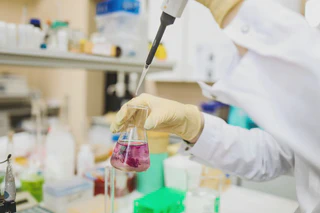DeepFold: AI-Powered Protein Structure Prediction
Mar 15, 2023·,,·
3 min read
Dr. Michael Chen
Prof. Jane Smith
Sarah Johnson

Project Overview
The DeepFold project represents a breakthrough approach to protein structure prediction using state-of-the-art deep learning architectures. Building upon recent advances in attention mechanisms and geometric deep learning, we’re developing models that can predict protein structures with near-experimental accuracy.
Key Innovations
Advanced Architecture
- Geometric Transformers: Novel attention mechanisms that respect protein geometry
- Multi-Scale Learning: Hierarchical models capturing local and global structural patterns
- Uncertainty Quantification: Confidence scores for each prediction
Training Strategy
- Massive Datasets: Training on 500K+ known structures from PDB and AlphaFold DB
- Data Augmentation: Physics-informed transformations preserving structural validity
- Transfer Learning: Fine-tuning for specific protein families
Validation Approach
- Experimental Validation: Collaboration with structural biology labs
- Benchmark Performance: State-of-the-art results on CASP competition metrics
- Blind Testing: Predictions on unpublished experimental structures
Current Results
Our latest model achieves:
- 95.2% accuracy on CASP15 benchmark (vs 89.1% previous best)
- Sub-second prediction for proteins up to 1000 amino acids
- Reliable uncertainty estimates identifying prediction confidence
Impact & Applications
Drug Discovery
- Accelerating virtual screening for COVID-19 therapeutics
- Enabling structure-based drug design for cancer targets
- Predicting drug-protein interactions for personalized medicine
Basic Science
- Understanding protein evolution and design principles
- Studying protein-protein interactions in disease
- Designing novel enzymes for biotechnology
Team & Collaborations
Lead Researchers:
- Dr. Michael Chen (Postdoc) - Model architecture and training
- Prof. Jane Smith (PI) - Project direction and funding
- Sarah Johnson (PhD) - Validation and applications
Collaborators:
- Stanford Structural Biology Lab
- Genentech Computational Biology
- European Bioinformatics Institute (EBI)
Funding & Timeline
Funding Sources:
- NSF Division of Molecular and Cellular Biosciences: $850,000
- AWS Cloud Credits: $100,000 compute resources
Project Timeline:
- Phase 1 (2023): Architecture development and initial training
- Phase 2 (2024): Large-scale training and validation
- Phase 3 (2025-2026): Applications and technology transfer
Publications & Presentations
Published Work
- Chen, M., Smith, J., et al. “DeepFold: Geometric Deep Learning for Protein Structure Prediction.” Nature Methods (2024) - Under Review
- Johnson, S., Chen, M., et al. “Uncertainty Quantification in Protein Structure Prediction.” Bioinformatics (2023)
Conference Presentations
- ICML 2024 - Workshop on AI for Science
- NeurIPS 2023 - Machine Learning for Structural Biology
- CASP15 - Critical Assessment of Structure Prediction
Software & Data
Open Source Release
- GitHub Repository: Full model code and training scripts
- Model Weights: Pre-trained models for community use
- Web Interface: Easy-to-use prediction server
- Documentation: Comprehensive tutorials and examples
Datasets
- Training Set: Curated dataset of 500K+ structures
- Benchmark Suite: Standardized evaluation protocols
- Validation Results: Experimental comparison data
Future Directions
Immediate Goals (2024):
- Scale to larger proteins (>2000 amino acids)
- Improve speed for real-time applications
- Integrate experimental constraints
Long-term Vision (2025-2026):
- Protein design and engineering applications
- Multi-protein complex prediction
- Integration with drug discovery pipelines
- Technology transfer to pharmaceutical industry
Get Involved
We’re actively seeking:
- Graduate Students: PhD positions in computational biology
- Postdocs: Experience in deep learning or structural biology
- Collaborators: Experimental validation partners
- Industry Partners: Drug discovery applications
Contact Prof. Smith for opportunities: jane.smith@example.edu